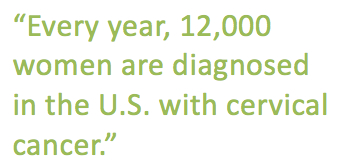This week, the U.S. Food and Drug Administration (FDA) approved the use of human papillomavirus DNA tests as the first line of screening for cervical cancer. The HPV DNA test had initially been approved for use alongside or as a follow-up for the standard Pap test in 2011. The FDA has essentially labeled the DNA test as the go-to for this deadly cancer.
The approval has come swiftly following the FDA advisory committee’s unanimous vote in support of this measure last month. However, the HPV DNA test has only been approved for women over the age of 24.
What’s the HPV DNA Test?
The cobas HPV test was developed by Roche Molecular Systems Inc. to help determine if a woman required additional screening for this deadly disease. The DNA test also provided health care experts with enough additional information to determine her future risk for cancer.
The Pap test has been the golden standard for cervical cancer for the last six decades– especially given the lack of distinguishable symptoms. The test can identify abnormal squamous cells which could signify the presence of disease. The vaginal swabbing is required in both a Pap test and the HPV DNA test, so patient’s won’t even be able to tell the difference.
“The potential benefit of (the HPV test) is that everybody that has a precancerous change or cervical cancer will have a positive test,” explained Dr. Kevin Ault. “You’re not going to miss anybody.”
(Dr. Ault currently teaches at the University of Kansas Medical Center in Kansas City.)
This isn’t the first HPV test to hit the market, but this particular test happens to be the most effective at identifying two particular virus strains— 16 and 18. The DNA test is also capable of identifying 12 other HPV strains that have been linked to elevated cancer risk.
(Fast Fact: The human papillomavirus is responsible for 99 percent of all cervical cancers.)
Are there Any Drawbacks to this Type of Test?
Unfortunately there is one particular issue with HPV tests— between 2 and 10 percent of women will test positive for the virus. HPV is extremely common (nearly 70 percent of sexually active get an infection at one point or another) but most women never develop cervical cancer as a result.
“Most people who get HPV only have it for a few months or a year and then it goes away,” stated Dr. Ault. “It’s really the people it persists in that are going to have the problem.”
How Do You Distinguish Between those that have HPV?
As you might have guessed, a positive HPV DNA test will mean the patient needs additional screening. The patient may also need to have:
- A Pap smear
- A biopsy of the area
- Additional procedures
Dr. Ault suggests that the increased paranoia and fear over cervical cancer could be a disadvantage to using HPV tests. Since people who don’t have HPV are unlikely to need a Pap, this means doctors can focus their available resources on a much more targeted patient population. Several health experts have noted this as the driving force behind the HPV tests new role.

Results that come back negative on both are obviously a very positive sign for women. Experts agree that these patients have an extremely low risk for developing cervical cancer in the near future.
Implementing the HPV DNA Test
“Every year, 12,000 women are diagnosed in the U.S. with cervical cancer. This is especially tragic because cervical cancer is a largely preventable disease, and it is well established that HPV is the cause of almost all cervical cancers worldwide. Women need better access to screening tools that include primary HPV screening in order to reduce their risk of developing cervical cancer,” explained Dr. Thomas Wright Jr., an expert in gynecology and pathology at Columbia University Medical Center.
There might be a period of time before the HPV test is properly integrated, but it shouldn’t prove too much of a challenge since most gynecologists already have a lot of experience performing routine Pap tests.
It should be noted that the FDA’s approval this week has not changed contemporary practice guidelines.
The guidelines in place for cervical cancer screening are in large proposed via the American College of Obstetricians and Gynecologists, the American Cancer Society and other organizations. The FDA has merely approved the test for usage at this time.

